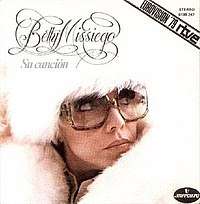Su canción
"Su canción" (Spanish pronunciation: [su kanˈθjon], "Your Song") is a song recorded by Peruvian/Spanish singer Betty Missiego. The song was written by Fernando Moreno. It is best known as the Spanish entry at the Eurovision Song Contest 1979, held in Jerusalem, Israel. The song was internally chosen by the Spanish broadcaster, Televisión Española (TVE), as their representative in the Contest that year.[1]
| "Su canción" | |
|---|---|
 | |
| Single by Betty Missiego | |
| from the album Su canción | |
| B-side | "Contrastes" |
| Released | 1979 |
| Length | 2:59 |
| Label | Mercury |
| Songwriter(s) | Fernando Moreno |
| Eurovision Song Contest 1979 entry | |
| Country | |
| Artist(s) | Betty Missiego[1] |
| Language | |
| Composer(s) | Fernando Moreno[1] |
| Lyricist(s) | Fernando Moreno |
| Conductor | José Luis Navarro |
| Finals performance | |
| Final result | 2nd |
| Final points | 116 |
| Entry chronology | |
| ◄ "Bailemos un vals" (1978) | |
| "Quédate esta noche" (1980) ► | |
Internal selection
From 1977 to 1999, TVE used an internal selection process to select both the singer and the song to represent them at Eurovision. For 1979, Betty Missiego, a 34-year-old singer and television presenter from Peru who had previous song contest experience representing Peru at the OTI Festival 1972 in Madrid, was selected to go to Jerusalem with the song "Su canción", written and composed by Fernando Moreno.
At Eurovision
At Jerusalem, the song was the nineteenth and final song performed that evening, after Austria's Christina Simon with "Heute in Jerusalem." At the end of judging that evening, "Su canción" took the second-place slot with 116 points.[2] Spain was given 12 points by Italy, Switzerland, Germany and Belgium, 12 points being the maximum score allotted to one country by another.
The song was performed from the point of view of "una mujer mayor" (a grown-up woman, ostensibly Missiego), who lived a solitary life until she found joy in the world around her through children who asked her to sing a song with them. At the end, she implores everyone to sing along with her, so the song can become "theirs" as well. Unique that year was her use of children as backup singers of sorts, joining her in "her song." The children on stage that evening were Javier Glaria, Alexis Carmona, Beatriz Carmona, and Rosalía Rodríguez.[3] At the end of the song, the children unfurl small banners, with "thanks" inscribed on each in English, Spanish, Hebrew and French, respectively.
As Spain was the last country to perform, it was also the last to vote. Before its points were awarded to the other countries, it had led the Contest by one point. When it awarded Israel and its song "Hallelujah" 10 points it had, by extension, granted it the win.
According to the official Eurovision website, it was rumored after the contest that Spain gave high marks to Israel to prevent their own country from having to host the Contest in 1980, thus saving themselves the high expenses of an international production.[2]
Success
"Su canción", ending in second place, was the best showing for a Eurovision entry Spain had seen since 1973, in which the country also placed second.[4] It would be the best placing for Spain in the Contest until 1995, when they would place second again.[5] The 2nd place and 116 points is the same placing as Spain had in 1971 with the song En un mundo nuevo, which also took second place with 116 points.
As a result of the high placing, it is remembered as one of the more notable moments for Spain in the Contest, so much so that both Missiego and songwriter Moreno have been involved in events with OGAE, the official Eurovision fan club.[6] In 2006, Missiego was a guest of honor at a Spanish OGAE meeting, alongside Massiel, winner of the Contest for Spain in 1968, and Conchita Bautista, who sang the first Spanish entry at Eurovision in 1961.[6]
Missiego recorded "Su canción" in four different languages, besides Spanish also French ("Dès qu'un enfant chante"), Italian ("Vola l'amore") and German ("Der mann im mond").[7]
"Su canción" was succeeded as the Spanish entry at the 1980 Contest by Trigo Limpio with "Quédate esta noche".
Sources and external links
- Official Eurovision Song Contest site, history by year, 1979.
- Detailed info and lyrics, The Diggiloo Thrush, "Su canción".
References
- "Spain in the Eurovision Song Contest 1979". EBU. Retrieved 2008-10-07.
- "Eurovision Song Contest 1979". EBU. Retrieved 2008-10-07.
- Info on children from Diggiloo Thrush
- "Eurovision Song Contest 1973". EBU. Retrieved 2008-10-07.
- "Spain in the Eurovision Song Contest". EBU. Retrieved 2008-10-07.
- "3 former participants met the fans". ESCtoday.com. Retrieved 2008-10-07.
- Rateyourmusic.com, discography Betty Missiego. Retrieved 2 December 2009.